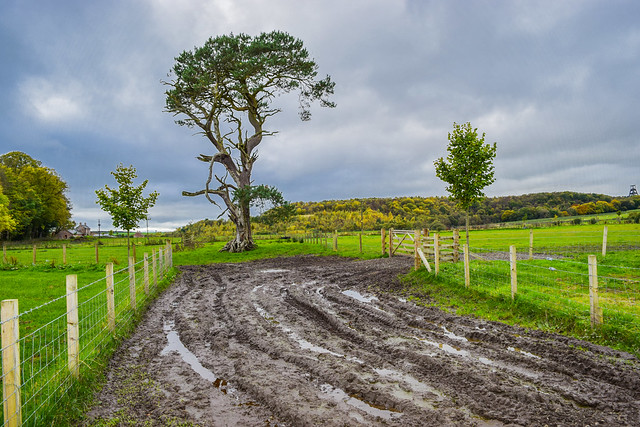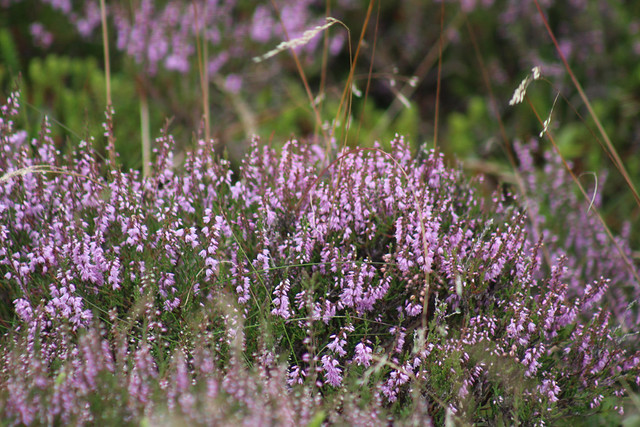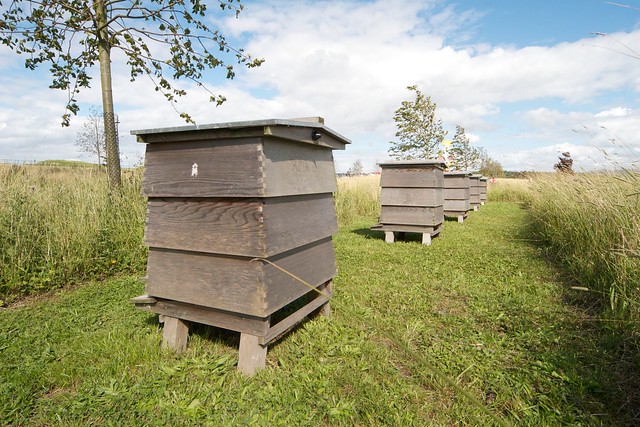Words for mud and related things in Celtic languages.
Words marked with a * are reconstructions.
| Proto-Celtic | *latyos = moist |
|---|---|
| Old Irish (Goídelc) | lathach [dʲerɡ] = mud, mire |
| Middle Irish (Gaoidhealg) | lathach, laithech, lathaig = mire, puddle, quagmire, morass |
| Irish (Gaeilge) | lathach [ˈl̪ˠɑhəx / l̪ˠaiç] = mud, slush, slime |
| Scottish Gaelic (Gàidhlig) | lathach [l̪ˠa.əx] = mire, ooze, sludge, quicksand lathach-mhòine = peat-bog lathach sàile = saltmarsh lathachach [l̪ˠa.əxəx] = muddy, oozy, sludgy lathachail [l̪ˠa.əxal] = muddy, oozy, sludgy lathadh = besemearing, (be)numbing, heat (in cats) |
| Manx (Gaelg) | laagh = mire, mud laagh vog = sludge laaghagh = muddy, sludgy, slushy laaghan = muddy place, slough |
| Proto-Brythonic | *llėd = mud |
| Middle Welsh (Kymraec) | llaid = mud, mire, dirt, clay, slime, ooze lleidyawc = muddy, clayey, miry, oozy, slimy |
| Welsh (Cymraeg) | llaid [ɬai̯d] = mud, mire, dirt, clay, slime, ooze, quagmire, quicksand, dregs lleidfa = muddy or clayey place lleidfysgaf, lleidfysgu = to, knead, work clay, bespatter with mud or dirt, bedraggle, bemire lleidiaf, lleidio = to turn into mud or clay, become sodden lleidiog = muddy, clayey, miry, oozy, slimy lleidiogaf, lleidiogi = to become muddy or miry lleidiogrwydd = muddiness, ooziness, turbidity lleidiol = full of mud, muddy, miry, clayey |
| Middle Cornish (Cernewec) | lued, luth, lyys, lys, lŷs = mud, mire, dirt, filth luedic = miry, filthy, stinking lyys haal = salt-marsh |
| Cornish (Kernewek) | leys [lɛɪz] = mud, slime leysek = mire |
| Middle Breton (Brezonec) | lec’hid = slime, silt |
| Breton (Brezhoneg) | lec’hid = slime, silt lec’hidadur = siltation lec’hidan, lec’hidañ = to silt up, become gelatinous, viscous lec’hideg = mudflat lec’hidus = muddy |
Etymology from Proto-Indo-European *lat- (damp, wet). Words from the same roots include latex in English, latãkas (chute, gutter, duct) in Lithuanian, and lag (to wet, moisten) in Albanian [source].
| Old Irish (Goídelc) | láp = mud, mire, sin, vice |
|---|---|
| Middle Irish (Gaoidhealg) | láip [l͈aːb] = mud, mire, sin, vice |
| Irish (Gaeilge) | láib [l̪ˠɑːbʲ/l̪ˠæːbʲ] = mud, mire; to muddy, spatter caoch láibe = mole oitir láibe = mud-bank |
| Scottish Gaelic (Gàidhlig) | làb [l̪ˠaːb] = mire, mud, muddy puddle, day’s labour làbach [l̪ˠaːbəx] = marsh, swamp làbachas [l̪ˠaːbəxəs] = swampiness, bogginess làban [l̪ˠaːban] = mire, mud, muddy place, dirty work, drudgery, wet and muddy person làbanachadh [l̪ˠaːbanəxəɣ] = smearing, daubing, dirtying, wallowing, bedraggling, drenching làbrach [l̪ˠaːbarəx] = miry, muddy, dirty, dirty/unkempt person |
| Middle Cornish (Cernewec) | loob = slime, sludge |
| Cornish (Kernewek) | loub = slime, sludge louba = to lubricate |
Etymology: probably related to lathach [source].
| Proto-Celtic | *kʷrīyess = clay |
|---|---|
| Old Irish (Goídelc) | cré [kʲrʲeː] = clay, earth |
| Middle Irish (Gaoidhealg) | cré, cre = clay, earth créda, criadta, criata, creodae = clayey, earthen, fictile (pliable, moldable) |
| Irish (Gaeilge) | cré = clay, earth, dust créachadh = (act of) earthing, moulding créafóg = clay, earth crécholúr = clay pigeon cré-earra = earthenware créúil = clayey, earthy |
| Scottish Gaelic (Gàidhlig) | criadh [krʲiəɣ] = clay criadgadair [krʲia.ədɪrʲ] = potter criadhadaireachd [krʲia.ədɪrʲəxg] = pottery |
| Manx (Gaelg) | cray = ash, clay, pipe clay crayee = ceramic, earthen crayoil = clayey, earthy |
| Proto-Brythonic | *prið [ˈpriːð] = clay, mud, earth |
| Middle Welsh (Kymraec) | prid, pridd = soil, earth, dust, ground, clay, mortar, plaster priddo = to cover with earth, bury pridell, priddell = clod, sod, dust, soil priddled, priddlyd = earthy, earthen, dirty, dusty, |
| Welsh (Cymraeg) | pridd [priːð] = soil, earth, dust, ground, clay, mortar, plaster priddach = soil, earth, clay, earthenware pridd(i)af, pridd(i)o = to cover with earth, bury, plaster, daub priddawr = potter pridd-dom = dirt, mud, clay priddell = clod, sod, dust, soil, grave, potsherd, brick, tile priddfaen = brick, (earthenware) tile for making bricks priddl(l)yd = earthy, earthen, dirty, dusty, uncouth priddwr = mason, plasterer, burier |
| Middle Cornish (Cernewec) | pri, pry, prî = mould, earth, clay prian, prían = clayey ground |
| Cornish (Kernewek) | pri = clay, mud priek = clayey prien = clay ground priweyth = pottery priweythor, priweythores = potter priweythva = clay-works, pottery |
| Old Breton (Brethonoc) | pri = clay, mudt |
| Middle Breton (Brezonec) | pry = clay, mud |
| Breton (Brezhoneg) | pri [priː] = clay, mud, mortar priaj = ceramic prian, priañ = to coat with clay priasell = waste, quagmire priasellek = full of clay mud prieg = clayey, muddy |
Etymology possibly from Proto-Indo-European *krey- (to siftm separate, divide). Words from the same roots include latex in English, latãkas (chute, gutter, duct) in Lithuanian, and lag (to wet, moisten) in Albanian [source].
| Middle Breton (Brezonec) | fanc, fancq, fang, fank = mud, excrement |
|---|---|
| Breton (Brezhoneg) | fank [ˈfãŋk] = mud, excrement fankan, fankañ = to poop fankeg = muddy |
Etymology from Norman fanque (mud) [source] from Old French fange (mud, addle, mire), from Vulgar Latin *fanga/*fangus (mud), possibly from Frankish, from Proto-Germanic *fanją (swamp, fen). The French words fange (filth, mire, debauchery) and fagne (marshland, fen), and the Catalan word fang (mud) come from the same roots [source].
| Middle Welsh (Kymraec) | llaka, lacca, llacca = mud, sludge, mire, dirt, muck, puddle, filth, slome |
|---|---|
| Welsh (Cymraeg) | llaca [ɬaka] = mud, sludge, mire, dirt, muck, puddle, filth, slime llaceilyd = muddy, miry, dirty |
Etymology from Middle English lake/laca (lake, stream; ditch, drain, sewer), from Old French lac (lake) or Latin lacus (lake, basin, tank), to-Italic *lakus (lake), from Proto-Indo-European *lókus (pond, pool) [source].
| Proto-Celtic | *lutā = dirt, mud |
|---|---|
| Gaulish | *lutos = swamp |
| Celtiberian | *lutā = swamp |
| Old Irish (Goídelc) | loth [ˈloθ] = mire, mud, swamp, marsh |
| Middle Irish (Gaoidhealg) | loth, lath = mud, mire, quagmire, marsh |
| Irish (Gaeilge) | lodair = to cover with mud, muddy, to wallow in mire, grovel lodán = stagnant pool, puddle lodar = miry place, slough, soft, flabby person lodartha = muddy, slushy, slobby, soft, flabby, grovelling, abject, base, vulgar lodarthacht = muddiness, slushiness, softness, flabbiness, abjectness, baseness, vulgarity |
| Scottish Gaelic (Gàidhlig) | lod [l̪ˠɔd] = pool, pond, marsh lodagan = small pool of water lodan = puddle, small pool, small marsh |
Etymology from Proto-Indo-European *lew- (dirt, mud) [source].
Lutetia, the Gallo-Roman town founded in 52 BC that became Paris, gets it’s name from the Gaulish word *lutos (swamp) [source]. It was known as Lutetia Parisiorum by the Romans.
Sources: Wiktionary, Am Faclair Beag, Online Manx Dictionary, Teanglann.ie, eDIL – Electronic Dictionary of the Irish Language, In Dúil Bélrai English – Old Irish glossary, Geiriadur Prifysgol Cymru, Gerlyver Kernewek, Dictionaire Favereau, TermOfis, English – ProtoCeltic WordList (PDF), Etymological Dictionary Of Proto Celtic












